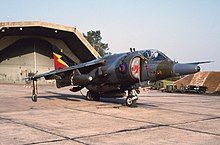Duncan Simpson
Duncan Menzies Soutar Simpson OBE FRAeS FIMechE (23 December 1927 - 5 December 2017)[1] was a Scottish test pilot who played a key role in the development of the Hunter aircraft, the Harrier, and the Hawk advanced trainer flown by the RAF’s Red Arrows.[2] He was the former chief test pilot of Hawker Siddeley in the 1970s.[2] He flew the first production Harrier aircraft in December 1967, and the first two-seat Harrier in April 1969.[2]
Early life
[edit]He was born in Edinburgh, and was educated at Merchiston Castle School there. His uncle was a test pilot for the Fairey Aviation Company.
Career
[edit]de Havilland
[edit]After leaving school in 1945 he worked for de Havilland in Hertfordshire.
Royal Air Force
[edit]In 1949 he joined the Royal Air Force with 6FTS and 226 OCU, and flew the Gloster Meteor VIII with 222 Squadron. In 1953 he joined the Day Fighter Development Unit at the Central Fighter Establishment.
Hawker Siddeley Aviation
[edit]
He joined Hawker Siddeley in 1954. He first flew the Hawker Siddeley P.1127 in August 1962; he was the third pilot to fly the P.1127. On 27 December 1967, he was the first the fly the first production Harrier GR1 XV738. On 24 April 1969[3] he was the first to fly the two-seat Harrier XW174; six weeks later on 4 June 1969 in this aircraft, he was forced to eject at low level (100 ft), over Larkhill in Wiltshire, when the engine failed at 3,000 ft. On ejection from the aircraft he broke his neck; he needed a bone graft, and surgeons had to operate via his throat. He returned to flying nine months later, and received the Queen's Commendation for Valuable Service in the Air in the 1969 Birthday Honours. After this incident, all Hawker aircraft were fitted with canopy severance cord[4] to shatter the canopy before ejection occurred.
He became deputy chief test pilot in 1969. He became chief test pilot in 1970. He was the first to fly the Hawk HS1182 prototype (XX154) at around 7pm on 21 August 1974,[5] and reached 20,000 ft in a 53-minute flight. The Hawk entered service with the RAF in November 1976.

Personal life
[edit]He married in June 1958 and had two sons, and a daughter. They lived in Guildford, Surrey.
He received an award in 2011 from the Honourable Company of Air Pilots. He received the OBE in the 1973 Birthday Honours. He became a Fellow of the Society of Experimental Test Pilots. He died aged 89 in December 2017.
See also
[edit]- Ralph Hooper, designer of the Harrier and the Hawk
- List of Harrier family losses
- Edward Tennant, first to fly the Folland Gnat on 18 July 1955 from RAF Boscombe Down to RAF Chilbolton in Hampshire
References
[edit]- ^ Companies House
- ^ a b c "Duncan Simpson, test pilot – obituary". The Telegraph. 14 December 2017. ISSN 0307-1235. Retrieved 24 August 2024.
- ^ Flight International. 28 September 1972. p. 422 https://web.archive.org/web/20180810174744/https://www.flightglobal.com/FlightPDFArchive/1972/1972%20-%202597.PDF. Archived from the original (PDF) on 10 August 2018.
{{cite magazine}}: Missing or empty|title=(help) - ^ See definition by ChemRing Energetics
- ^ Hawker Siddeley Aviation and Dynamics: 1960-77
External links
[edit]- 1927 births
- 2017 deaths
- Military personnel from Edinburgh
- 20th-century Royal Air Force personnel
- BAE Systems Hawk
- De Havilland
- Fellows of the Institution of Mechanical Engineers
- Fellows of the Royal Aeronautical Society
- Harrier Jump Jet
- Hawker Siddeley
- Officers of the Order of the British Empire
- People educated at Merchiston Castle School
- People from Edinburgh
- People from Guildford
- Recipients of the Commendation for Valuable Service in the Air
- Royal Air Force officers
- Scottish test pilots
- Scottish airmen
